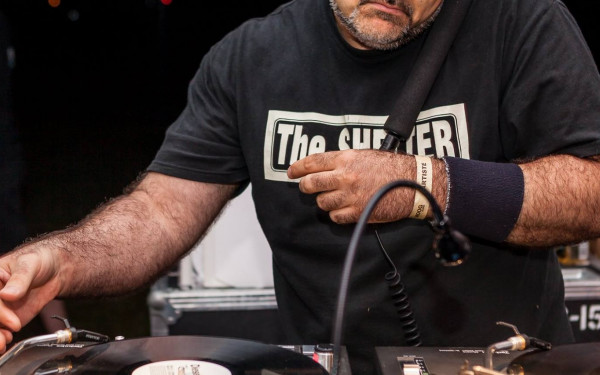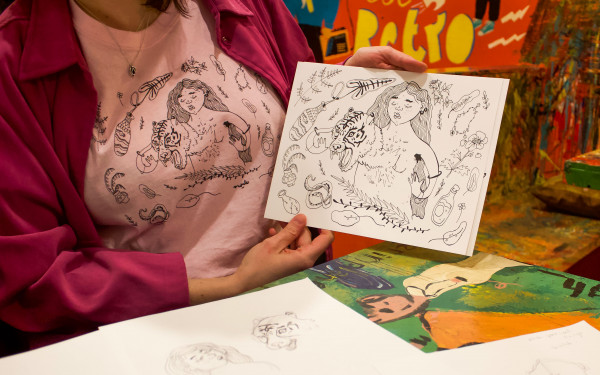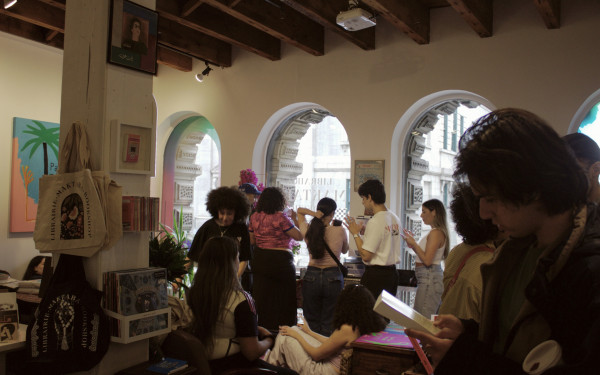Out of the Trenches
Tim Miller on the HIV/AIDS Culture Wars
The fallen heroes of a different kind of war were remembered last Thursday at Tim Miller’s lecture, Sex/Body/Self/Virus.
The long-time HIV/AIDS activist and queer performance artist dedicated his Concordia talk and performance to honouring his friends who died in the early 90s from AIDS while fighting in the “culture wars” in the United States.
“Everyone in this photo, except for me and the two women are dead,” said Miller, 52, pointing to the projected image behind him. It was of a dozen shiny youthful faces sitting in a line, about to be arrested by the police behind them.
“James Caroll Pickett,” he said, pointing to a young man with glasses in the middle of the photo. “One of the most important American queer playwrights. Dead. Mark Kostopoulos, founder of ACT UP Los Angeles. Dead[…] And on this Remembrance Day, it’s all I’ve been able to think about.”
{exp:flvplugin playerpath=“http://thelinknewspaper.ca/scripts/player.swf” file=“http://www.youtube.com/watch%3Fv%3D{youtube_id}” playernumber=”{entry_id}” width=“400” height=“302” skin=“overlay.swf” frontcolor=“ffffff” lightcolor=“cc9900” controlbar=“over” icons=“false” wmode=“transparent” image=“video-default.png”}
Miller joined the AIDS Coalition to Unleash Power (ACT UP) New York, an AIDS advocacy group, in the 1980s after moving to New York City. During this time, he was arrested for civil disobedience on several occasions and became the first person to have his funding pulled from the National Endowment for the Arts in 1990.
“I was 20 the first time I went to visit my boyfriend, who was one of the very first people to be diagnosed with AIDS in New York City in 1981,” he said. “[The AIDS crisis] has literally been with me my entire adult life.”
In 1990, AIDS deaths peaked in America. It was out of that tragedy that Miller began his career as a one-man army against the AIDS crisis through performance art, designed to change the political narrative of the George H.W. Bush era in the United States.
“Even amid that horror and loss, I found power in being able to claim, ‘I’m still here,’” he said. “I’m still here to raise my voice, I’m still here as a member of ACT UP, […] and that ‘I’m still here’ space is at the heart of why I am an artist and a political activist.”
Miller’s lecture was presented by HIV/AIDS Concordia and the Fine Arts Students Alliance as part of the 18th season of the Concordia University Community Lecture Series on HIV/AIDS. The series attempts to raise awareness of social, scientific and cultural aspects of the AIDS pandemic.
While the subject matter contained definite elements of personal mourning, Miller stressed the positivity of his outlook.
“A huge part of what keeps me going is the miracle that I’m alive,” he said. “I assumed I would not be alive to live this long, as one did in 1992.”
Despite having this personal mandate of the strength in survival, Miller stated that ACT UP lost the culture war in the States and that, while he sees cultural representation as extremely important, art alone is not enough.
Jason Crawford, a Concordia HIV/AIDS course instructor, agreed. He said AIDS was and remains an “extended state of emergency,” and the way in which those most affected by HIV/AIDS responded has been unique.
“People infected and affected by HIV-AIDS turned to civil disobedience and performative political action to make health a social justice issue,” Crawford said. “They challenged notions of health, sex and well-being, and fought in the trenches of the culture wars. We need to remember this more than ever.”
Since ending his engagement in public manifestations with ACT UP, Miller has dedicated his political and performance work to marriage equality and immigration rights for gays and lesbians in the United States. And while he noted some advancements in the treatment of queer people, he says that America remains an extremely dangerous place for queers to live.
Miller encouraged students to not be afraid to take action through civil disobedience.
“Make your sound now. Jump on the table. Make the police be called. Get dragged off. Raise your voice now.”
This article originally appeared in Volume 31, Issue 14, published November 16, 2010.

__900_598_90.jpg)





